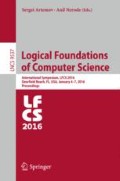Abstract
Imagine a database – a set of propositions \(\varGamma =\{F_1,\ldots ,F_n\}\) with some kind of probability estimates, and let a proposition X logically follow from \(\varGamma \). What is the best justified lower bound of the probability of X? The traditional approach, e.g., within Adams’ Probability Logic, computes the numeric lower bound for X corresponding to the worst-case scenario. We suggest a more flexible parameterized approach by assuming probability events \(u_1,u_2,\ldots ,u_n\) which support \(\varGamma \), and calculating aggregated evidence \(e(u_1,u_2,\ldots ,u_n)\) for X. The probability of e provides a tight lower bound for any, not only a worst-case, situation. The problem is formalized in a version of justification logic and the conclusions are supported by corresponding completeness theorems. This approach can handle conflicting and inconsistent data and allows the gathering both positive and negative evidence for the same proposition.
Access this chapter
Tax calculation will be finalised at checkout
Purchases are for personal use only
Notes
- 1.
Since \(P(B\mid A)= P(A\cap B)/P(A)\).
- 2.
This axiom can be replaced by an explicit list of its instances corresponding to a standard algorithm for deciding \(s\preceq t\) (cf. [14]).
- 3.
\(\varGamma \) is not necessarily compatible with set \(u_1^*,u_2^*,\ldots ,u_n^*\) but we ignore this question for now by assuming that the given evidence is consistent with \(\varGamma \).
References
Adams, E.W.: A Primer of Probability Logic. CSLI Publications, Stanford (1998)
Adams, E.W., Levine, H.P.: On the uncertainties transmitted from premisses to conclusions in deductive inferences. Synthese 30, 429–460 (1975)
Artemov, S.: Explicit provability and constructive semantics. Bull. Symbolic Log. 7(1), 1–36 (2001)
Artemov, S.: The logic of justification. Rev. Symbolic Log. 1(4), 477–513 (2008)
Clemen, R., Winkler, R.: Aggregating probability distributions. In: Advances in Decision Analysis: From Foundations to Applications, pp. 154–176 (2007)
Dung, P.M.: On the acceptability of arguments and its fundamental role in nonmonotonic reasoning, logic programming and \(n\)-person games. Artif. Intell. 77(2), 321–357 (1995)
Feller, W.: An Introduction to Probability Theory and its Applications. Wiley, New York (1968)
Fitting, M.: The logic of proofs, semantically. Ann. Pure Appl. Logic 132(1), 1–25 (2005)
Halpern, J.: Reasoning About Uncertainty. MIT Press, Cambridge (2003)
Kolmogorov, A.: Grundbegriffe der Wahrscheinlichkeitrechnung. Ergebnisse Der Mathematik. Springer, Heidelberg (1993). Translated as: Foundations of Probability. Chelsea Publishing Company, New York (1950)
List, C.: The theory of judgment aggregation: an introductory review. Synthese 187(1), 179–207 (2012)
Shiryaev, A.: Probability. Graduate Texts in Mathematics, vol. 95. Springer, New York (1996)
Suppes, P.: Probabilistic inference and the concept of total evidence. In: Hintikka, J., Suppes, P. (eds.) Aspects of inductive logic, pp. 49–65. Elsevier, Amsterdam (1966)
Whitman, P.: Free lattices. Ann. Math. 42(1), 325–330 (1941)
Acknowledgements
The author is very grateful to Melvin Fitting, Vladimir Krupski, Elena Nogina, Tudor Protopopescu, Çağıl Taşdemir, and participants of the Trends in Logic XV conference in Delft for inspiring discussions and helpful suggestions. Special thanks to Karen Kletter for editing and proofreading this text.
Author information
Authors and Affiliations
Corresponding author
Editor information
Editors and Affiliations
Rights and permissions
Copyright information
© 2016 Springer International Publishing Switzerland
About this paper
Cite this paper
Artemov, S. (2016). On Aggregating Probabilistic Evidence. In: Artemov, S., Nerode, A. (eds) Logical Foundations of Computer Science. LFCS 2016. Lecture Notes in Computer Science(), vol 9537. Springer, Cham. https://doi.org/10.1007/978-3-319-27683-0_3
Download citation
DOI: https://doi.org/10.1007/978-3-319-27683-0_3
Published:
Publisher Name: Springer, Cham
Print ISBN: 978-3-319-27682-3
Online ISBN: 978-3-319-27683-0
eBook Packages: Computer ScienceComputer Science (R0)

